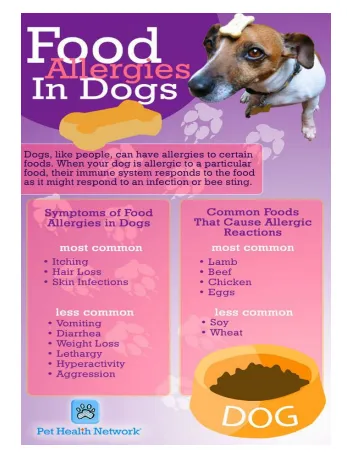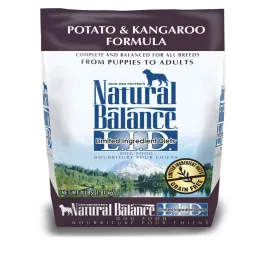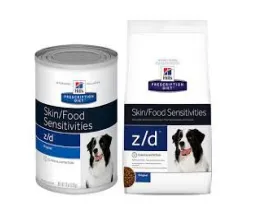What are food allergies or food intolerance?
Dr. Louis N. Gotthelf (member American Academy of Veterinary Dermatology)
Montgomery Pet Skin and Ear Clinic
3310 Atlanta Highway
Montgomery, AL 36109
Food allergies or food intolerance are caused by a reaction to a particular ingredient that the dog eats. Sometimes referred to as an ‘adverse reaction to food,’ it is defined as an abnormal response to a food or food additive. There are two classes of adverse reactions: those in which the immune system is involved (generally called food allergies); and those that occur without an immune component (generally called food intolerances).
What does food allergy look like? Food allergies often mimic other skin diseases, and many dogs have other allergies such as flea-bite dermatitis and atopy. Dogs with chronic or recurring external ear infections should be evaluated for food allergies. Redness and itching or thickened elephant skin around the rectal area may be a tip off to a food allergy. Food allergy pattern usually is referred to as “ears and rears.” Recurrent skin infections, especially on the top of the back or sides may be a food allergy.
If your dog vomits frequently, has diarrhea, irritated skin, a poor coat condition or hair loss, then he may have a food allergy. You may also notice some of the following signs: vomiting, excessive gas, poor growth in puppies.
What causes food allergies / intolerance? Food allergies often show up in very young dogs as they begin to eat solid foods. Skin and ear diseases of young puppies are often treated with a diet change. In some older dogs, it may take months or years before your dog develops an allergic response to a particular food. However, once he's allergic, he will almost always have a negative reaction to that food. Allergic reactions are most commonly associated with protein sources - usually the meat proteins in your dog's food. The most common causes of food allergies / intolerance in dogs are beef, chicken, and milk products. Many dog foods contain either casein or whey, which are milk products.
Is my dog sensitive to foods? Specific diagnosis of food allergies in your dog is difficult. The most common symptoms of a food allergy / intolerance are digestive upsets or skin irritation. They are frequently characterized by itching and less commonly by gastrointestinal signs. Skin lesions on dogs are frequently located on the "ears and rears."
How will I know if my dog has a food allergy? Once the veterinarian suspects food allergies, the only way to know if there really is a food allergy is to do a food elimination diet trial. There are no blood tests that will tell if the dog is food allergic. Elimination diets fall into two categories.
1. Novel (new) protein diets. Usually these foods have a protein source that the dog's digestive system has never been exposed to. For example, kangaroo meat, duck meat, venison, and salmon are protein sources common in these special diets.
2. Hydrolyzed protein diets. These diets are composed of normal proteins that are chemically broken down into very tiny molecules that the digestive system cannot recognize as the large original protein. If the immune system cannot recognize the molecule, it cannot mount a reaction against it. Hill's Prescription diet z/d is the best food for this test. It contains hydrolyzed corn and chicken liver proteins, so it is very tasty to most dogs.
The diets are given for a minimum of 6 weeks to see if there is a difference in the skin disease and the itching. If the diet is helpful, then it is useful to "challenge" the dog with its old diet to see if the skin reacts against it. If it does, then another diet with different proteins can be tried until one that is compatible with the dog is found. Some clients opt to leave the dog on the hydrolyzed diet as their food source. They cannot have flavored medications or treats that may contain allergens.



